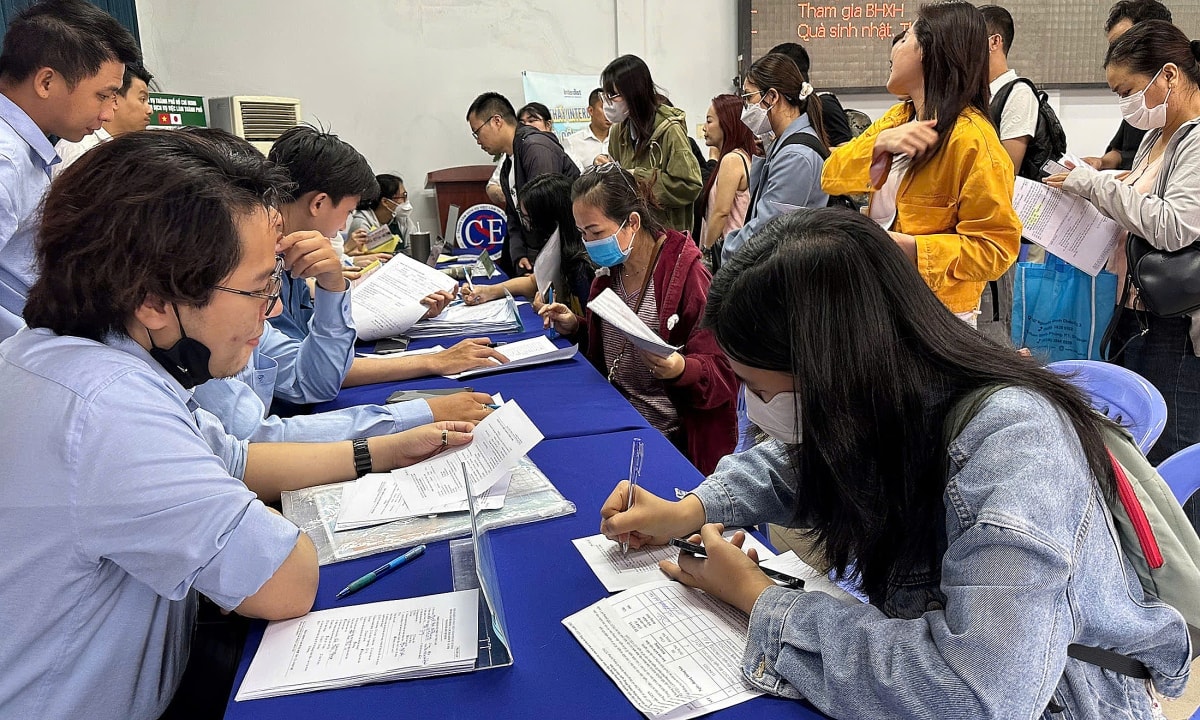
Willing to lower his salary for the opportunity, former civil servant Nguyen Thanh Tam, 34 years old, requested that after the probationary period, the company consider adjusting his income if he performed well in the assigned tasks.
Ms. Thanh Tam used to be an official working for the Southern office of a ministry-level agency in Ho Chi Minh City, specializing in social insurance and labor law. Her agency was dissolved to streamline its apparatus according to Resolution 18. She was one of the first to submit her resignation, officially leaving the public sector after more than 10 years of service.
After a week of officially leaving the State, Ms. Tam found her first job but quickly realized that she was not suitable. In the job description, the company required employees to do procedures related to insurance, salary, and relations with State management agencies. However, when she started her probationary period, she was asked to find a way to "circumvent" the law, paying social insurance for only more than half of the staff and the payment level was lower than the actual income to reduce costs.
"At first, I was very happy because the company hired me because of my experience working for the government, but when I found out the purpose, I was quite sad. Not only was it a matter of ethics for someone who had worked in the public service, but I also felt unsafe for myself in the long run," said Ms. Tam. Therefore, she quit after a week, even though her income was equivalent to that of a government employee.
At the second company, before going to the interview, she carefully researched the company's compliance with legal regulations and welfare policies. The former employee realized that although the company had not met expectations, it had not done anything wrong. The new workplace was close to home and she had 2 days off on weekends, which gave her time to attend English classes. However, at this company, the recruiter had a prejudice against government employees as "rigid and inactive".
"I proactively offered a lower salary than the number they offered to be given the opportunity," Tam said. However, the former employee suggested that if after 2 months of probation, she proved her ability and integrated well, the two sides would have to renegotiate. The flexibility during the interview helped the company's leaders have a good impression and agree to accept her on probation.
After more than a month of working at the new company, Ms. Tam said she always tries to do the assigned tasks as quickly and accurately as possible. If she doesn't understand something, she will boldly ask her colleagues. "For example, I process administrative documents very quickly. What is the working process with state agencies and what are the procedures are my strengths," Ms. Tam said.
Regarding the environment, she feels lucky that the company's staff is young and dynamic, making it easy for her to fit in. She herself has also changed her way of dressing to "shed her rigid shell" to suit the new environment.
"Being comfortable, trying your best and not being afraid to learn from colleagues will help people leaving the State overcome the initial pressure," Ms. Tam concluded.
Meanwhile, as a civil servant who retired early, Ms. Nguyen Thu Lan, 54 years old, chose to return to her favorite job of teaching foreign languages and life skills to children. Graduated from university with a major in economics and foreign languages in 1991, Ms. Lan worked as an interpreter for an agency of the Ministry of Health and then moved to work for a representative agency under the Government in Ho Chi Minh City.
The new job in the city does not require foreign languages, so to avoid fading away, she still maintains the habit of reading books and novels in English and tutoring students on weekends and after school. "The tuition fee is only symbolic because teaching also helps me not to forget the knowledge," Ms. Lan said.
When the agency was dissolved to streamline the apparatus according to Resolution 18, she was the first to resign. "I have been attached to the State sector since the first days of opening, now is the time for young people to show themselves," said the former civil servant. With the support of more than 300 million VND, she invested in more documents, lesson plans, tables and chairs, and learned more pedagogical methods to teach more systematically.
According to Ms. Lan, many people her age also choose to leave the public sector and proactively prepare for early retirement to avoid disappointment. Some people completely abandon their profession to do what they love, such as baking, yoga instructors, participating in professional associations, and continuing to contribute knowledge as experts.
"If you are determined enough, you will have opportunities and create value in any environment," said Ms. Lan.

Ms. Lan and Ms. Tam are public sector officials who left when the Government reorganized ministries, ministerial-level agencies, agencies and local professional agencies. In this group, about 100,000 officials, civil servants and public employees were affected. Regarding the merger of administrative units from 63 to 34 provinces and cities, the whole country will reduce more than 18,400 provincial-level positions, more than 110,000 commune-level positions and more than 120,000 non-professional workers, according to the Ministry of Home Affairs .
In addition to the financial support policy under Decree 178 and 67, localities such as Ho Chi Minh City also developed their own support projects such as job referrals for retired officials and civil servants at state-owned enterprises, support for business loans, and purchase of social housing... With the support, some chose to invest in their own businesses, but many continued to seek opportunities in the private sector.
After many years working in the public sector and then moving to the private sector, Mr. Tran Ngoc Minh, Sales Director of Rockwool Group in Vietnam, said that in order to adapt when leaving the public sector, officials need to learn about the private environment. The characteristics of the private sector are high work pressure and fierce competition. This environment has low stability, employees are at risk of being fired if they do not meet KPI requirements, sales and have to work overtime, etc. However, if they are capable, employees have the opportunity to be promoted quickly, with attractive salaries and bonuses and are paid according to their abilities.
"Once you understand the working environment, it will be easier to adapt and integrate, and less shocking," said Mr. Minh. According to him, those who are about to join the private sector need to be mentally prepared, ready to change their thinking, learn, and adapt. They must accept differences in working culture and prepare themselves to work at high intensity.
Next, former officials and civil servants need to have a plan to improve their own capacity and not be afraid to learn from their colleagues and superiors. Officials from the State environment who have been downsized need to identify their strengths and weaknesses, supplement their missing knowledge, especially skills related to technology and AI applications.
According to Mr. Minh, a former official and civil servant, gradually building relationships in a new workplace such as communicating openly and getting along with colleagues is also necessary; creating a professional network of relationships, and finding a mentor for yourself.
"The private sector highly values those who dare to express themselves," said Mr. Minh. Therefore, former civil servants and public employees should be proactive in their work, give their opinions and contributions, demonstrate a sense of responsibility, commit to completing tasks and prove their abilities through work results.
Besides, to balance, people who have just left the State sector should spend time with family, friends, and participate in physical activities to balance life.
TB (according to VnExpress)Source: https://baohaiduong.vn/can-bo-dien-tinh-gian-hoc-cach-thich-nghi-khi-roi-nha-nuoc-412305.html






























![[Photo] National Assembly Chairman Tran Thanh Man visits Vietnamese Heroic Mother Ta Thi Tran](https://vphoto.vietnam.vn/thumb/1200x675/vietnam/resource/IMAGE/2025/7/20/765c0bd057dd44ad83ab89fe0255b783)



































































Comment (0)